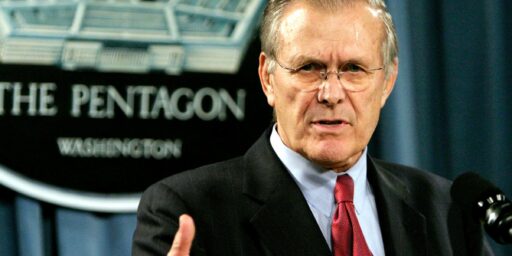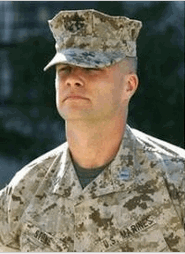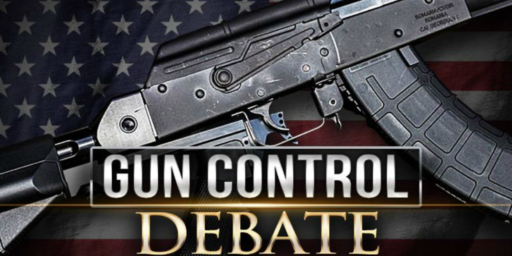Military Clears Troops in Ishaqi Incident
An investigation by the U.S. military has ruled that the civilians killed in a raid by U.S. forces in the village of Ishaqi were collateral damage in a strike on a legitimate military target.
AP:
A military investigation into allegations that U.S. troops intentionally killed Iraqi civilians in a March raid in a village north of Baghdad has cleared the troops of misconduct, two defense officials said Friday, despite dramatic video footage of slain children. The investigation of the March 15 attack in the village of Ishaqi concluded that the U.S. troops followed normal procedures in raising the level of force as they came under attack upon approaching a building where they believed an al-Qaida terrorist was hiding, two defense officials said. The probe was part of U.S. investigations into possible misconduct by American troops in at least three separate areas.
Reuters adds:
A U.S. military probe has exonerated U.S. troops in the deaths of Iraqi civilians in the town of Ishaqi in March, finding American forces followed standard procedures and committed no misconduct, defense officials said on Friday. The Ishaqi incident was one of a handful involving civilian deaths being investigated by the U.S. military, including the deaths of 24 civilians in the town of Haditha last November.
Police in Ishaqi, 60 miles north of Baghdad, have said six adults and five children were shot dead in a U.S. military raid on a home on March 15. The U.S. military maintains there were four dead in the incident, including a guerrilla, two women and a child, and said they died after troops were fired upon from the house as they arrived to arrest an al Qaeda suspect. The defense officials, speaking on condition of anonymity, said an investigation found no wrongdoing by U.S. forces. The officials said a military fact-finding inquiry determined that U.S. forces followed proper procedures and that the civilian deaths were unintentional.
[…]
U.S. officials described a nighttime raid aimed at finding a specific guerrilla, who then fled the building but was later caught. Another guerrilla who fired from the building was killed in the raid, they said. “When the assault force arrived, they took fire,” said one official. The U.S. troops then pulled back and called in air support from an AC-130 gunship, and U.S. forces then fired on the house, the official said.
No further investigation of the incident is planned by the U.S. military, the official said.
Police in Ishaqi have offered a different account. Police said five children, four women and two men were shot dead by troops in a house that was then blown up. They said all the victims were shot in the head, and that the bodies, with hands bound, were dumped in one room before the house was destroyed. Television footage showed the bodies in a morgue. Their wounds were not clear, although one infant had a gaping head wound.
Raw Story has numerous still photographs of the incident, taken by AFP, which are quite gruesome. I’ve thumbnailed several below.









Two things are clear, aside from the tragedy of dead innocents: Few of them appear to have been shot in the head and none of them appear to have their hands bound. (That’s true, too, of the poor victim photographed by AP’s Hameed Rashee, thumbnailed with the AP story at top.) His commenters nonetheless see them as evidence of “murder.”
Iraqi Prime Minister Nuri al-Maliki has said he is losing patience with reports of U.S. troops killing civilians. Many Iraqis believe unjustified killings by U.S. troops are common, but few have been confirmed by official investigations. The White House said on Friday it shares Maliki’s concerns about civilian deaths in Iraq, allegedly by U.S. Marines, and emphasized Washington wants to work with him.
While some of this reaction on al-Maliki’s part is obviously for public consumption, he has reason to be cynical. As this morning’s NYT notes, the military’s handling of the massacre in Haditha was not in the highest traditions of the service.
Marine commanders in Iraq learned within two days of the killings in Haditha last November that Iraqi civilians had died from gunfire, not a roadside bomb as initially reported, but the officers involved saw no reason to investigate further, according to a senior Marine officer.
The commanders have told investigators they had not viewed as unusual, in a combat environment, the discrepancies that emerged almost immediately in accounts about how the two dozen Iraqis died, and that they had no information at the time suggesting that any civilians had been killed deliberately.
But the handling of the matter by the senior Marine commanders in Haditha, and whether officers and enlisted personnel tried to cover up what happened or missed signs suggesting that the civilian killings were not accidental, has become a major element of the investigation by an Army general into the entire episode.
Officials have said that the investigation, while not yet complete, is likely to conclude that a small group of marines carried out the unprovoked killings of two dozen civilians in the hours after a makeshift bomb killed a marine.
A senior Marine general familiar with the investigation, which is being led by Maj. Gen. Eldon A. Bargewell of the Army, said in an interview that it had not yet established how high up the chain of command culpability for the killings extended. But he said there were strong suspicions that some officers knew that the Marine squad’s version of events had enough holes and discrepancies that it should have been looked into more deeply. “It’s impossible to believe they didn’t know,” the Marine general said, referring to midlevel and senior officers. “You’d have to know this thing stunk.” He was granted anonymity, along with others who described the investigation, because he was not authorized to speak publicly about it.
Gary Farber has much, much more on Haditha.
SECDEF Don Rumsfeld is, quite reasonably, trying to put things into perspective:
“We know that 99.9 per cent of our forces conduct themselves in an exemplary manner,” said Mr. Rumsfeld. “We also know that in conflicts things that shouldn’t happen do happen.”
Not much doubt about either of those things.
But the American defense secretary sought to dispel the notion that there is a systemic problem involving the conduct of United States troops in Iraq or heightened concerns over the ability of American forces to maintain security in the Anbar province west of Baghdad. The major obstacle to progress in Iraq, he suggested, was not the United States, but rather the slow efforts by Mr. Maliki’s government to appoint Defense and Interior Ministers, two ministries that are central to securing Iraq. “My assessment of the situation is that the government that has been elected under the new constitution needs to appoint a defense minister and a minister of interior and get about the task of governing the country,” Mr. Rumsfeld said.
This, though, while doubtless true, is unlikely to win any hearts and minds. While the Iraqis have been maddeningly slow in getting their act together, it’s not as if they are going to be in charge of U.S. Marines’ raids, let alone how the USMC chain of command deals with obviously false reports.
Mr. Rumsfeld said that it was not surprising that Mr. Maliki’s government would take some time to select officials to oversee such critical ministries. The Iraqi prime minister, he said, understood that the ministries needed to be run by competent centrists and was taking his responsibilities seriously. Still, he said, the delays were undermining efforts to improve security in Iraq. “They have never done this and the period is long,” Mr. Rumsfeld said. “The problem is that people are getting killed during this period — coalition forces and Iraqis, innocent Iraqis are getting killed.. And that’s unfortunate, and therefore, there is a, needless to say, a sense of urgency on my part and I know on the part of the people involved.”
Mr. Rumsfeld also said that Mr. Maliki’s government needed to move ahead with a process of reconciliation to bring Sunnis opposed to the coalition into the government and, thus, take some of steam out of the insurgency. “If we are worried right now about the final appointment of the last two ministers — which we are, we would like it done — the next big step we are going to be looking towards is a reconciliation process that will, we believe, contribute to a more peaceful Iraq,” Mr.Rumsfeld said.
That would certainly be helpful. In essence, though, he’s saying that the only way to stop the killing of Iraqi civilians by American troops is to get the latter out of Iraq. While axiomatic, that’s unlikely to make the Iraqis feel any better.






Thanks for the link; Saturday morning’s Round-up is here.
Considering main stream media’s talent for mishearing things, I have the feeling the Iraqi police said that some of the dead were found bound and shot through the head, and the reporter taking down the information heard it as all the dead were found that way. Or an editor decided it made for a juicier story. Either way it reflects badly on journalism.